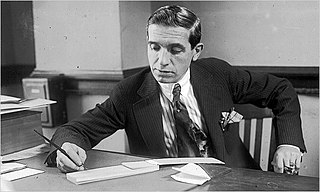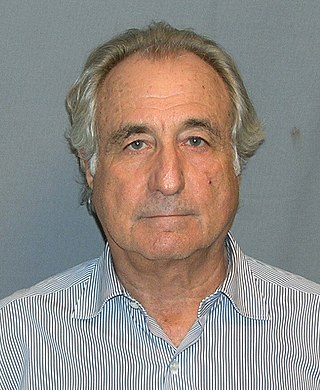
A Ponzi scheme is a form of fraud that lures investors and pays profits to earlier investors with funds from more recent investors. Named after Italian businessman Charles Ponzi, this type of scheme misleads investors by either falsely suggesting that profits are derived from legitimate business activities, or by exaggerating the extent and profitability of the legitimate business activities, leveraging new investments to fabricate or supplement these profits. A Ponzi scheme can maintain the illusion of a sustainable business as long as investors continue to contribute new funds, and as long as most of the investors do not demand full repayment or lose faith in the non-existent assets they are purported to own.

A pyramid scheme is a business model which, rather than earning money by sale of legitimate products to an end consumer, mainly earns money by recruiting new members with the promise of payments. As the number of members multiplies, recruiting quickly becomes increasingly difficult until it is impossible, and therefore most of the newer recruits do not make a profit. As such, pyramid schemes are unsustainable. The unsustainable nature of pyramid schemes has led to most countries outlawing them as a form of fraud.

Forensic accounting, forensic accountancy or financial forensics is the specialty practice area of accounting that investigates whether firms engage in financial reporting misconduct, or financial misconduct within the workplace by employees, officers or directors of the organization. Forensic accountants apply a range of skills and methods to determine whether there has been financial misconduct by the firm or its employees.
A high-yield investment program (HYIP) is a type of Ponzi scheme, an investment scam that promises unsustainably high return on investment by paying previous investors with the money invested by new investors.
Forensic accountants are experienced auditors, accountants, and investigators of legal and financial documents that are hired to look into possible suspicions of fraudulent activity within a company; or are hired by a company who may just want to prevent fraudulent activities from occurring. They also provide services in areas such as accounting, antitrust, damages, analysis, valuation, and general consulting. Forensic accountants have also been used in divorces, bankruptcy, insurance claims, personal injury claims, fraudulent claims, construction, royalty audits, and tracking terrorism by investigating financial records. Many forensic accountants work closely with law enforcement personnel and lawyers during investigations and often appear as expert witnesses during trials.
Thomas Joseph Petters is a former American businessman and chairman and CEO of Petters Group Worldwide, a company which stole over $2 billion in a Ponzi scheme. He was convicted of massive business fraud in 2009 and was imprisoned at the United States Penitentiary, Leavenworth. Amid mounting criminal investigations, Petters resigned as his company's CEO on September 29, 2008. He was convicted of numerous federal crimes for operating Petters Group Worldwide as a $3.65 billion Ponzi scheme and received a 50-year federal sentence.

Bernard Lawrence Madoff was an American financial criminal and financier who was the admitted mastermind of the largest known Ponzi scheme in history, worth an estimated $65 billion. He was at one time chairman of the Nasdaq stock exchange. Madoff's firm had two basic units: a stock brokerage and an asset management business; the Ponzi scheme was centered in the asset management business.
Harry M. Markopolos is an American former securities industry executive and a forensic accounting and financial fraud investigator.
David G. Friehling is an American accountant who was arrested and charged in March 2009 for his role in the Madoff investment scandal. He subsequently pleaded guilty to rubber-stamping Bernard Madoff's filings with regulators rather than fully reviewing them. His role in covering up Madoff's massive Ponzi scheme makes it the largest accounting fraud in history.
Nicholas Cosmo is an American former businessman and white-collar criminal. He was arrested January 26, 2009 on charges of an estimated $370–413 million Ponzi scheme. Cosmo conducted the scheme using his company Agape World Inc. in Hauppauge, New York, which claimed to make its profits via commercial bridge lending. Authorities arrested him in Hicksville, New York.

The Madoff investment scandal was a major case of stock and securities fraud discovered in late 2008. In December of that year, Bernie Madoff, the former Nasdaq chairman and founder of the Wall Street firm Bernard L. Madoff Investment Securities LLC, admitted that the wealth management arm of his business was an elaborate multi-billion-dollar Ponzi scheme.
William M. Parente was a New York real estate attorney who came into the spotlight following the murders of his wife and two daughters and his suicide. At the time, he was also under investigation by the FBI for an alleged Ponzi scheme.

Participants in the Madoff investment scandal included employees of Bernard Madoff's investment firm with specific knowledge of the Ponzi scheme, a three-person accounting firm that assembled his reports, and a network of feeder funds that invested their clients' money with Madoff while collecting significant fees. Madoff avoided most direct financial scrutiny by accepting investments only through these feeder funds, while obtaining false auditing statements for his firm. The liquidation trustee of Madoff's firm has implicated managers of the feeder funds for ignoring signs of Madoff's deception.
Laura Pendergest-Holt is a convicted Ponzi scheme perpetrator, financier, and former chief investment officer of Stanford Financial Group, who was charged with a civil charge of fraud on February 17, 2009. On May 12, 2009, Pendergest-Holt was indicted by a federal grand jury on two counts of a criminal complaint of obstructing a fraud investigation and conspiracy to obstruct justice. In early 2009, Stanford Financial became the subject of several fraud investigations, and on February 17, 2009, Pendergest-Holt was charged by the U.S. Securities and Exchange Commission with fraud and multiple violations of U.S. securities laws for alleged "massive ongoing fraud" involving $8 billion in certificates of deposit. The FBI raided three of Stanford's offices in Houston, Memphis, and Tupelo, Mississippi. On February 27, 2009, the SEC amended its complaint to describe the alleged fraud as a "massive Ponzi scheme". On June 21, 2012, she pleaded guilty to obstructing a U.S. Securities and Exchange Commission investigation into Stanford International Bank (SIB), the Antiguan offshore bank owned by Robert Allen Stanford. On September 13, 2012, Holt was sentenced to three years in prison, followed by three years of supervised probation. She was released on April 23, 2015.
Control fraud occurs when a trusted person in a high position of responsibility in a company, corporation, or state subverts the organization and engages in extensive fraud for personal gain. The term "control fraud" was coined by William K. Black to refer both to the acts of fraud and to the individuals who commit them.
Belvedere Management is a financial services group based in Mauritius that claims to have $16 billion of assets under administration. In March 2015, Offshore Alert described the group as a Ponzi scheme and it is currently under investigation by regulators in South Africa, Mauritius and Guernsey. The allegations remain unproven.

Bitconnect was an open-source cryptocurrency in 2016–2018 that was connected with a high-yield investment program, a type of Ponzi scheme. After the platform administrators closed the earning platform on January 16, 2018, and refunded the users' investments in BCC following a 92% coin value crash, confidence was lost and the value of the coin plummeted to below $1 from a previous high of nearly $525.
DC Solar Solutions Inc., trading as DC Solar, was a Benicia, California solar power supplier company whose owners lived lavishly on ill-gotten gains in Martinez. The company was shut down by the Federal Bureau of Investigation in 2018 after it turned out to be a billion-dollar Ponzi scheme.
Kenneth J. Casey was a Novato, California, real estate investor and member of the Marin County Human Rights Commission, charged in 2020 with "operating a massive Ponzi scheme" that defrauded "more than a thousand investors" while "embezzling tens of millions of dollars to personally enrich himself". Companies owned by him were investigated by the U.S. Securities and Exchange Commission (SEC), after attorneys said they had "engaged in serious misconduct over the nearly three decades prior to his death".




